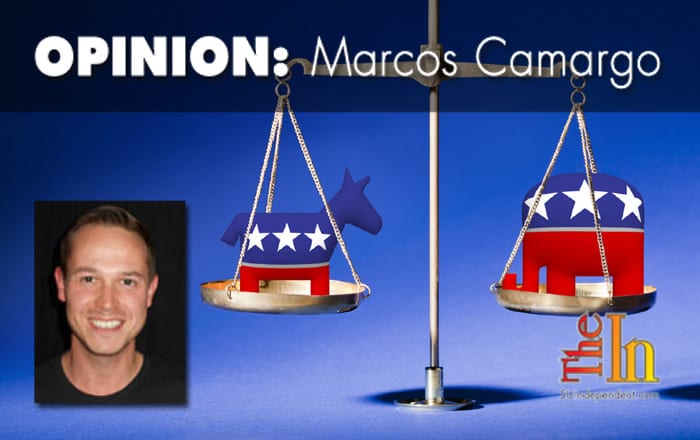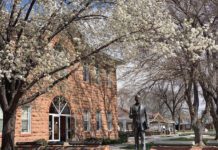
Written by Marcos Camargo
In a May 18 report from UtahPolicy.com entitled “Utah House Members Don’t Get a Lot of Love (Even Love Herself),” polling data showed declining public favor for Utah’s all-Republican congressional delegation.
Dan Jones & Associates conducted the survey, which polled only registered voters in each of Utah’s four congressional districts. Each congressperson—Rob Bishop, 1st District; Chris Stewart, 2nd District; Jason Chaffetz, 3rd District; and Mia Love 4th District—received percentages of ‘favorable,’ ‘unfavorable,’ ‘no opinion,’ and ‘never heard of’ based on how their constituents thought of them.
Rep. Chris Stewart came in with the lowest favorable rating of 45 percent and an unfavorable rating of 18 percent. Rep. Rob Bishop received 51 percent favorable and 28 percent unfavorable. Rep. Jason Chaffetz polled at 53 percent favorable and 28 percent unfavorable. Freshman Congresswoman Rep. Mia Love rated at 52 percent favorable. However, she also garnered the highest unfavorable ranking with 39 percent of registered voters in her district giving her a thumbs down.
Given the general frustration Americans have had toward Congress for the past several years, this poll doesn’t seem off par from the national trend. Yet historically, Utahns tend to like their elected officials, so something more than just overall dissatisfaction with the federal government seems to be at play. This survey comes less than one year after Utah elected its second most Republican State Legislature since the Great Depression, and it also follows the decision by Jim Matheson to retire after a 14-year tenure as Utah’s lone Democratic congressman.
So does Utah’s declining approval with its representatives have anything to do with a total single-party dominance of state politics? I’m going to say it does, and it can be described in one word: gerrymandering.
In Utah, as in many other states, U.S. congressional districts are approved by the state legislature and signed into law by the governor. Since the Utah State Legislature is currently comprised of 24 Republican senators out of 29 and 63 Republican house members out of 75, the Utah Republican party can cut, slice, graft, and splice legislative districts in pretty much anyway they choose. One only has to look at how Matheson’s (or any other Democratic congressional candidate’s) hope for continued re-election got slowly ground into the stuff that pipe dreams are made of.
From 1993 to 2002, the heart of Salt Lake City (one of the rare liberal areas of the state) stood as its own district. This allowed the limited yet significant Democratic minority of Utah to have a little outpost, a place where a small liberal bloc could protect their interests against the state’s majority conservative faction (see Federalist No. 10). But not being satisfied with three-quarters of the pie, Salt Lake was drawn and quartered in 2003. This redistricting significantly diluted the liberal vote. Yet Matheson held tight.
After slipping past the gerrymander chokehold one last time in 2012, Matheson announced that he would not run for re-election again in 2014. His narrow 2012 win came after another redistricting where Republicans cut Moab (probably the only other Democratic stronghold outside of Salt Lake County) out of his district. So now Utah has four congressional districts, each one of them takes part of Salt Lake to make sure those liberal urban dwellers don’t get two uppity.
So what would be a solution where the majority could get a majority slice while still leaving a piece for those outside the circled wagon train? The answer: a bipartisan redistricting commission. Several states have already implemented such committees. I know if the idea ever actually gained a foothold the wailing and gnashing of teeth would be heard all down the Wasatch front, but that doesn’t mean it shouldn’t be considered. I understand that Utah is a solidly Republican state, and I don’t expect that a committee would ever change that. But it may allow for a little more equal representation. And although Utah will probably be forever in the red (politically speaking), the blue team is still grossly under-represented.
According to Utah Data Points, a political science research consortium maintained by a group of BYU professors, 20 percent of Utah voters identify as Democratic, 12 percent as unaffiliated, 65 percent as Republican, and 3 percent as other. But among those that are unaffiliated 35 percent at least ‘lean’ Democratic, which means that a quarter of Utah voters side with the Democratic Party. Yet zero percent hold elected federal office, and the state legislature boasts a whopping 16 percent Democratic representation.
How is this the case? Well, I return to my original argument: the Utah Republican Party has gerrymandered the Democrat nigh into political extinction. And what’s come out of all this? Some of the lowest congressional approval ratings among Utah voters.
The Independent successfully contacted the chairs of both the Democratic and Republican parties here in Washington County for comment on these latest approval poll numbers.
As can be expected, the responses were quite different, but I feel it’s valuable to allow local party leaders to offer a statement.
Washington County Republican Party chair, Robert Jensen said, “While I hesitate to put too much stock in polling data, I suspect the lower reported ratings are simply a function of Utahn’s disappointment with Congress and the federal government as a whole. Utahns are expecting improvement, and we will see them being more and more watchful, especially in this upcoming presidential election year. This election cycle, Republicans gained nine seats in the Senate alone. Fiscally and politically conservative Americans are making their voice heard. Utah voters are no different.”
Jensen went on to add, “Additionally, while I haven’t read the survey itself, I am skeptical of polls generally and the inevitable statistical gerrymandering. Notice that one of the articles—I believe it was the article dealing with Senator Lee—appeared to use ‘less conservative’ and ‘moderate’ to designate non similar voters. Such confusion in terms renders the survey results questionable at best.”
The chair for the Washington County Democratic Party, Zachary Almaguer, sees the declining approval numbers both as evidence of voter disappointment in Utah’s Republican Party and as an opportunity for Democrats to gain traction among disaffected citizens.
“As a party here in Washington County, we are not surprised at the findings of the recent Jones poll,” said Almaguer. “These low approval figures only continue to express that the Republican Legislature, both in D.C. and in the State Congress, remain out of touch with the voters in their districts. These are not just critiques of a few leaders but of the party in the State as a whole. … Here in Washington County, water is perhaps the one issue that affects us all,” continued Almaguer. “Despite ongoing waste and ever increasing use, the conservatives here feel the solution is to drain an already overtaxed water source, Lake Powell, and then place the burden of payment onto the shoulders of the tax payers… Democrats should seize upon this opportunity to remind voters that larger social issues are important and the national debates will continue, but we should be voting on the issues that affect us locally.”
You know where I stand. Now it’s time to decide if party comes before people.
Marcos Camargo grew up in the rural heartland of Oregon. In 2003 he moved to Utah to find his place in the world and fell in love with the deserts of America’s arid country. An avid student of history and politics, he has a great interest in Western and Native American history and culture. He spends his free time exploring the wilderness of the Southwest.




